Airbnb ranks as one of the most visited travel and tourism websites in the world, and not without reason. Since its launch in 2007, Airbnb has truly transformed the hospitality industry, helping connect hosts and guests worldwide.
Today, it boasts more than 7.7 million active listings and more than 5 million hosts worldwide, with a two-sided network of more than 150 million guests who have booked more than 1.5 billion stays.
Airbnb has made it possible for people to let others use their properties, allowing travelers to enjoy different types of accommodations that do not resemble traditional hotels. This not only expands housing options, but also builds relationships between travelers and local communities.
By continuing to grow and respond to market demand, Airbnb has become a mainstay in the travel space and shows no signs of slowing down. In this regard, strong growth and user engagement make Airbnb a leader in redefining how people travel.
In this article, we are going to discuss how this major lodging rental website stands out from the rest and tell you in detail how to build a website like Airbnb.
Airbnb overview: marketplace structure and history
Unique marketplace structure
Airbnb has established itself as a leading company in the travel and tourism industry thanks to its innovative marketplace model.
If you are wondering how to create a website like Airbnb, you should know that Airbnb has the same functionality as any other booking website, but there is a global differentiating feature. While other Airbhub like booking websites facilitate interactions between guests and homeowners, Airbnb goes a step further by enabling direct contact between the two parties. In a typical operation on the platform, three key parties are involved:
Travelers. These are people looking for temporary accommodation with unique experiences that are not found in hotels. They benefit from a variety of options, from private rooms to the entire house, at different budgets and to satisfy their preferences.
Hosts. Hosts are those homeowners or property managers who list their spaces for rent on the platform. They have the flexibility to set prices, manage availability, and interact directly with guests, allowing for personalized hospitality.
Admins. Admins are the operators of the platform, ensuring smooth interactions between travelers and hosts. They ensure that policies are adhered to, facilitate communication, and manage the overall functionality of the Airbnb marketplace.
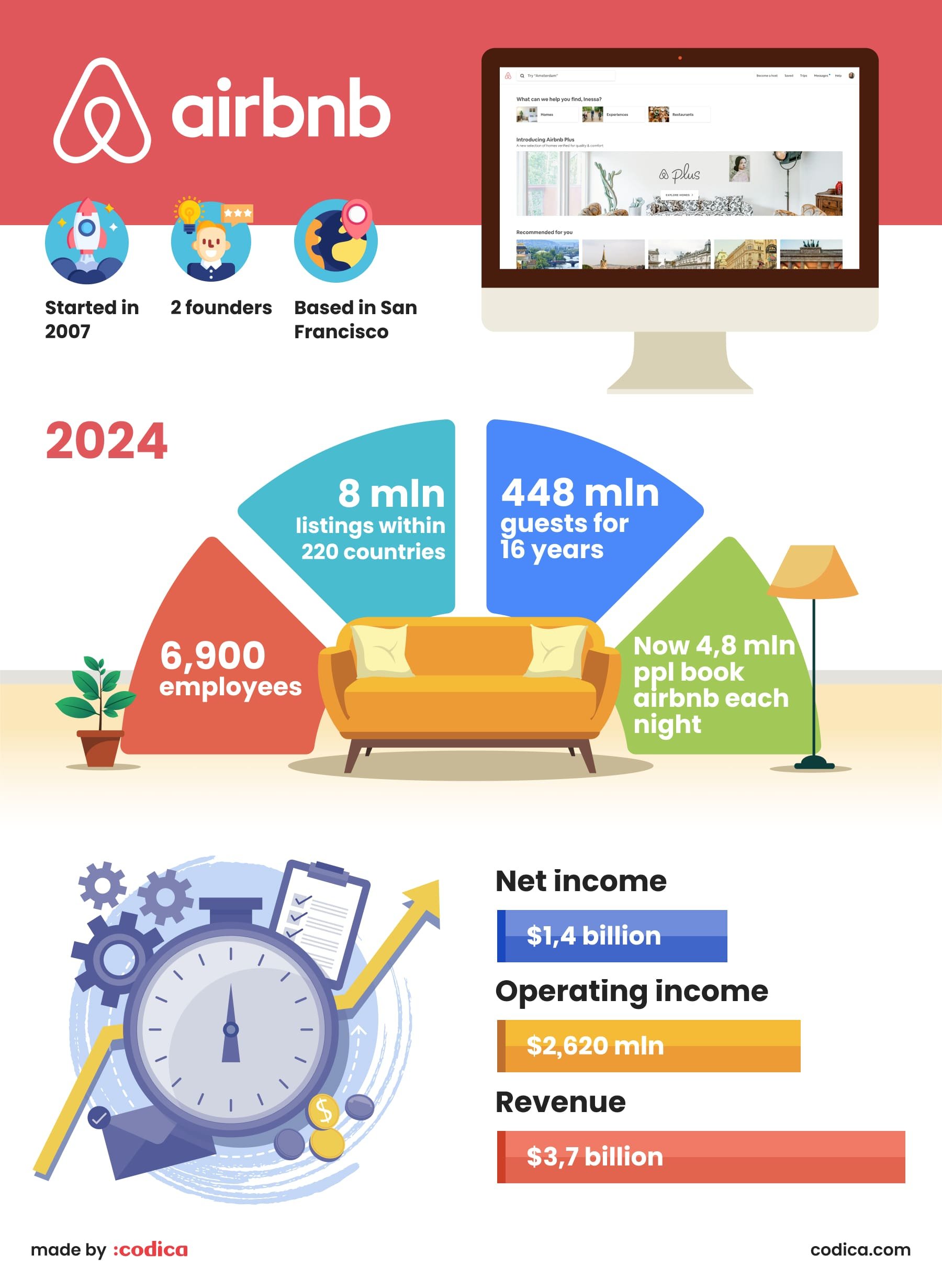
History of Airbnb
The story of Airbnb starts in August 2008. Two designers from San Francisco, California, Joe Gebbia and Brian Chesky, were on a tight budget. In order to make money to pay for their accommodation, they came up with the idea of renting out their living room in a bed and breakfast format. There were three airbeds for the guests.
When the designers received money for their accommodation, they started looking for investors to support their startup idea. Brian and Joe developed a simple website and posted their living room for rent there. Shortly, they improved and expanded the platform for use by other hosts and implemented additional functionality:
- Sign-up/login process;
- An option to be a traveler or host;
- An option to monitor new listings.
The worldwide known Ruby on Rails marketplace was initially named “AirBed and Breakfast.” As mentioned earlier, the primary core platform idea was to list couches and airbeds. In its early days, the website was quite similar to a paid version of the popular CouchSurfing service.
Starting as a room booking platform, Airbnb is now one of the world’s major accommodation rental marketplaces.
Airbnb main competitors
Having been on the market for a long time, Airbnb gained not only a good reputation but also strong competition. Airbnb’s main competitors have their own pros and cons, but it is worth studying the major ones to see how Airbnb stays afloat in the market.
Booking
Key information:
- Founded in 1996;
- 28 million accommodation listings;
- Approximately 6.2 million homes;
- Operates in 224 countries.
A startup situated in Amsterdam, Booking.com has evolved beyond its initial focus on hotel accommodations. It has expanded its offerings to include flights, rental cars, attractions, airport taxis, and bundled flight and hotel deals. While it initially concentrated on hotel accommodations, the platform has diversified its portfolio by investing in the growth of vacation rentals.
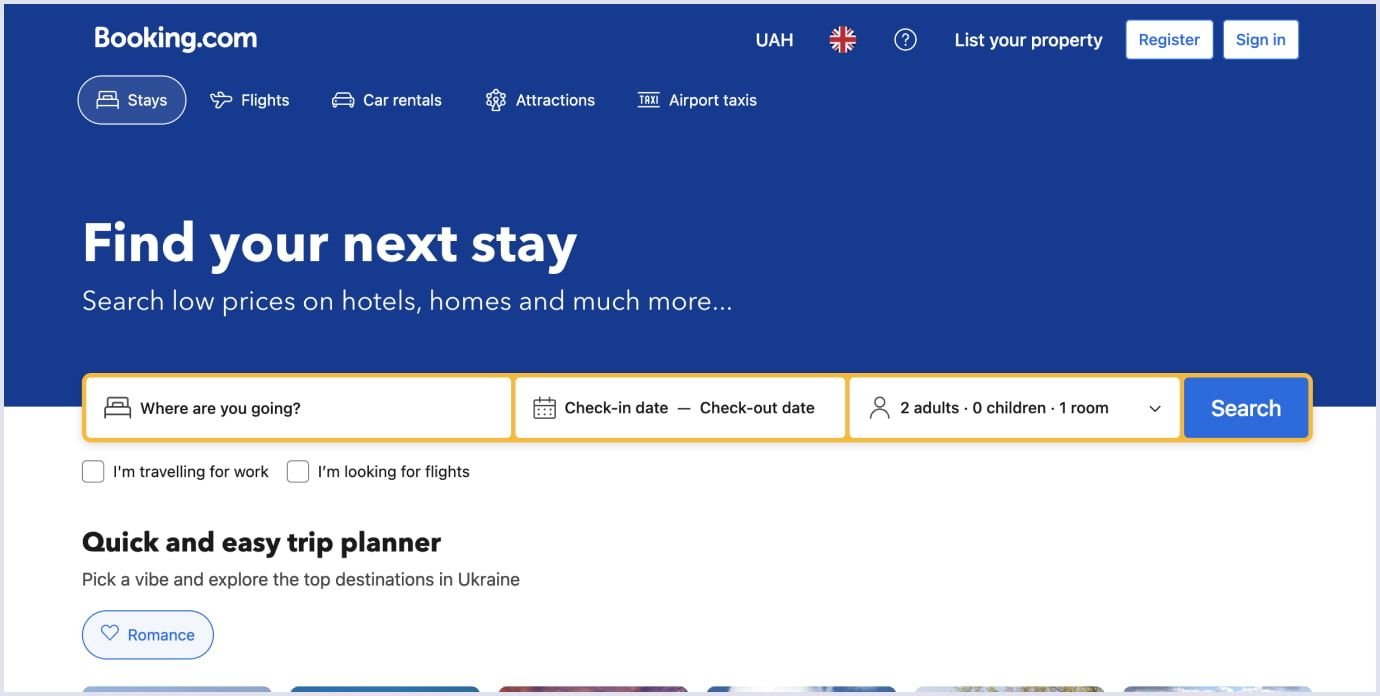
Source: Booking.com
How does Booking.com compare to Airbnb?
Both platforms carved out niches in the travel industry, each with its distinctive focus. Airbnb is renowned for empowering homeowners to profit by listing spare rooms or properties, while Booking.com remains primarily geared toward reserving hotel rooms.
Market-wise, Airbnb holds an advantage in the United States, whereas Booking.com dominates the European market. Booking.com's services span the entire spectrum of travel and vacation, encompassing hotels, flights, and car rentals, whereas Airbnb concentrates predominantly on vacation rentals.
Although Booking.com is venturing into the vacation rental business with its homestay option, its ability to compete with Airbnb in this category remains uncertain and will unfold over time.
Tripadvisor
Key information:
- Founded in 2000;
- Serves 490 million travelers monthly;
- Has 800+ million reviews;
- Lists 8.7 million options across 48 countries and 28 languages.
As the foremost online travel advisor, Tripadvisor stands out for its extensive ratings and reviews covering the travel industry, accommodations, activities, and entertainment. It offers hotels, vacation rentals, things to do, restaurants, travel forums, flights, cruises, and more.
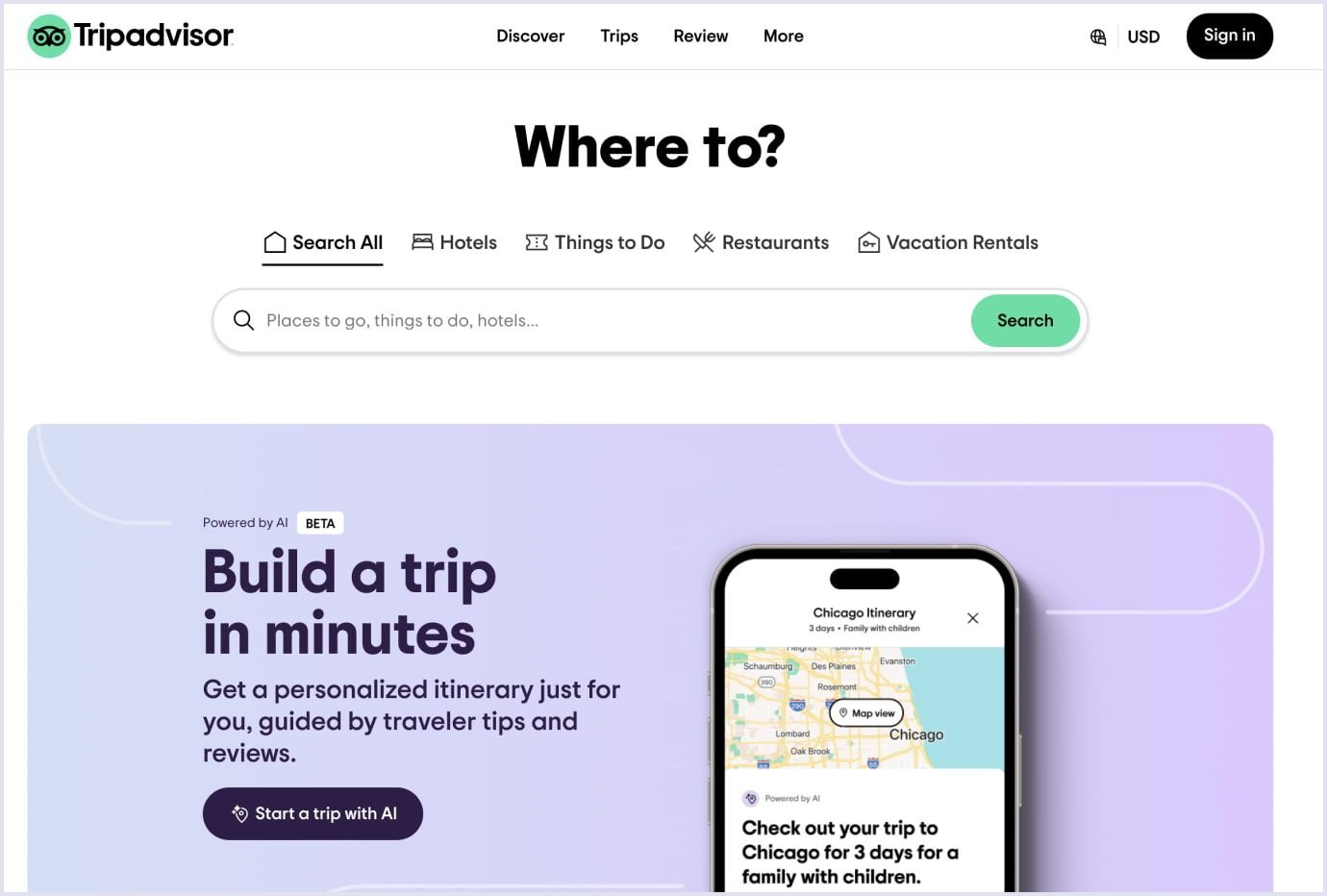
Source: TripAdvisor
How does Tripadvisor compete with Airbnb?
Tripadvisor is a full-fledged online travel agency (OTA) competing with hotels rather than just vacation rentals. Despite this, vacation rentals remain prominently visible on the homepage menu. Tripadvisor, including its subsidiary FlipKey, which we will cover next, automatically publishes listings on various brand pages, enhancing exposure. Both platforms award distinctive badges for exceptional services or accommodations, recognized as prestigious within the community.
FlipKey
Key information:
- Established in 2007;
- Boasts over 830,000 listings;
- Operates in ~190 countries.
A house-swapping platform, FlipKey became a Tripadvisor subsidiary in 2008, concentrating solely on vacation rentals. Leveraging its connection to Tripadvisor, FlipKey displays ratings directly from its parent company on listings, underscoring the significance of guest reviews.
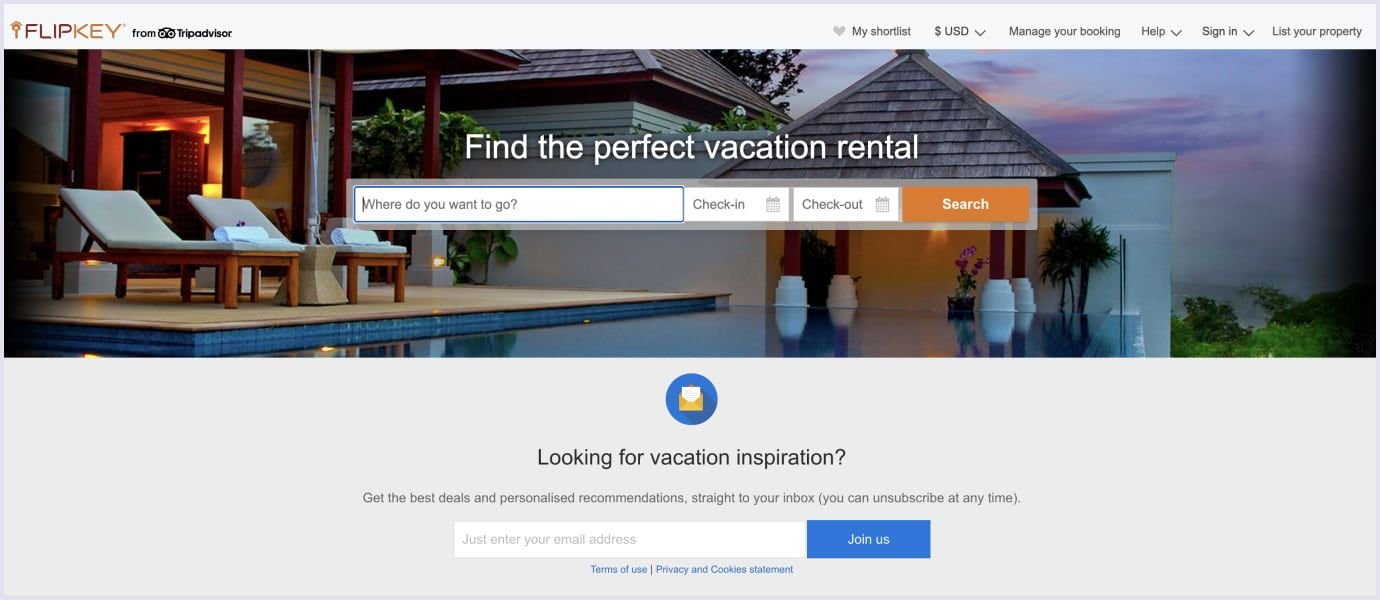
Source: FlipKey
How does FlipKey compare to Airbnb?
Both FlipKey and Airbnb focus primarily on vacation rentals. While Airbnb allows shared accommodations, FlipKey exclusively offers entire properties. Both platforms provide diverse housing options with filters to refine vacation rental searches. FlipKey's affiliation with Tripadvisor broadens its audience, attracting those seeking comprehensive vacation planning.
In summary, Tripadvisor and FlipKey, with their global reach and emphasis on traveler reviews, offer robust options for both accommodations and vacation planning. Their distinctions, including their connection to each other, contribute to their unique positions in the online travel landscape.
Vrbo
Key information:
- Founded in 1995;
- Over 2 million listings;
- Operates in 190+ countries.
As Airbnb's primary competitor, Vrbo is a key platform to consider for your vacation rental business, following closely behind Airbnb.
Vrbo, which stands for "vacation rentals by owner," began as an independent company in 1995. It became part of HomeAway in 2006 and was later acquired by the vacation industry giant Expedia Group in 2015.
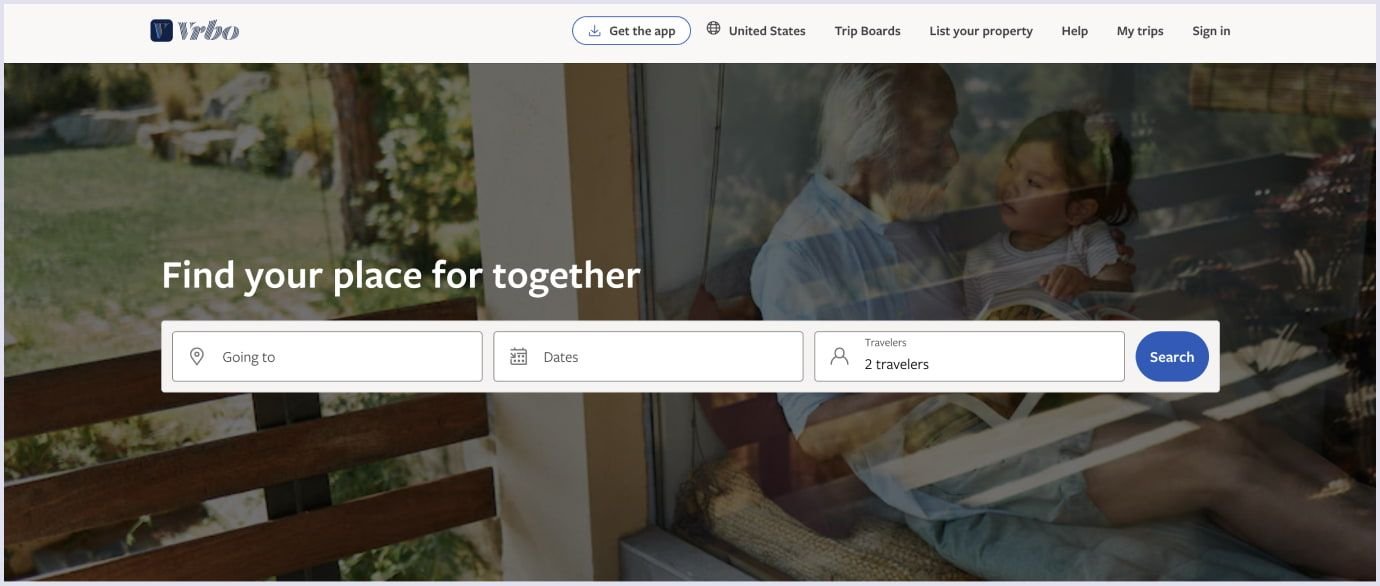
Source: Vrbo
As a component of the Expedia Group, Vrbo provides listers with access to the entire Expedia network. When you list your property on Vrbo, it automatically becomes visible on Expedia. This expands your reach from the 17.5 million unique monthly visitors on Vrbo to the massive audience of 730 million monthly unique visitors on the Expedia Group.
How does Vrbo compare to Airbnb?
As main competitors, Airbnb and Vrbo share numerous similarities. Both are vacation rental platforms where property owners directly list their accommodations. They offer diverse lodging options, including beach houses, mountain cabins, treehouses, villas, and boats.
These platforms also provide similar features, allowing both private and commercial property owners to rent their spaces, conduct transactions, earn commissions from bookings, and recognize hosts for outstanding service.
A notable distinction between Airbnb and Vrbo lies in the types of rentals offered. Vrbo exclusively presents entire properties for rent—entire apartments, houses, villas, or condominiums. In contrast, Airbnb offers the option for house shares, where guests may share living spaces. Due to this difference, Vrbo tends to attract larger and more upscale rental properties, catering particularly to families, groups of friends, and travelers with higher budgets.
Expedia
Key information:
- Founded in 1996;
- Over 3 million lodgings;
- Operates in more than 70 countries.
Being a well-established online travel agency (OTA), Expedia provides comprehensive vacation services, covering flights, car rentals, accommodations, activities, cruises, and bundled packages.
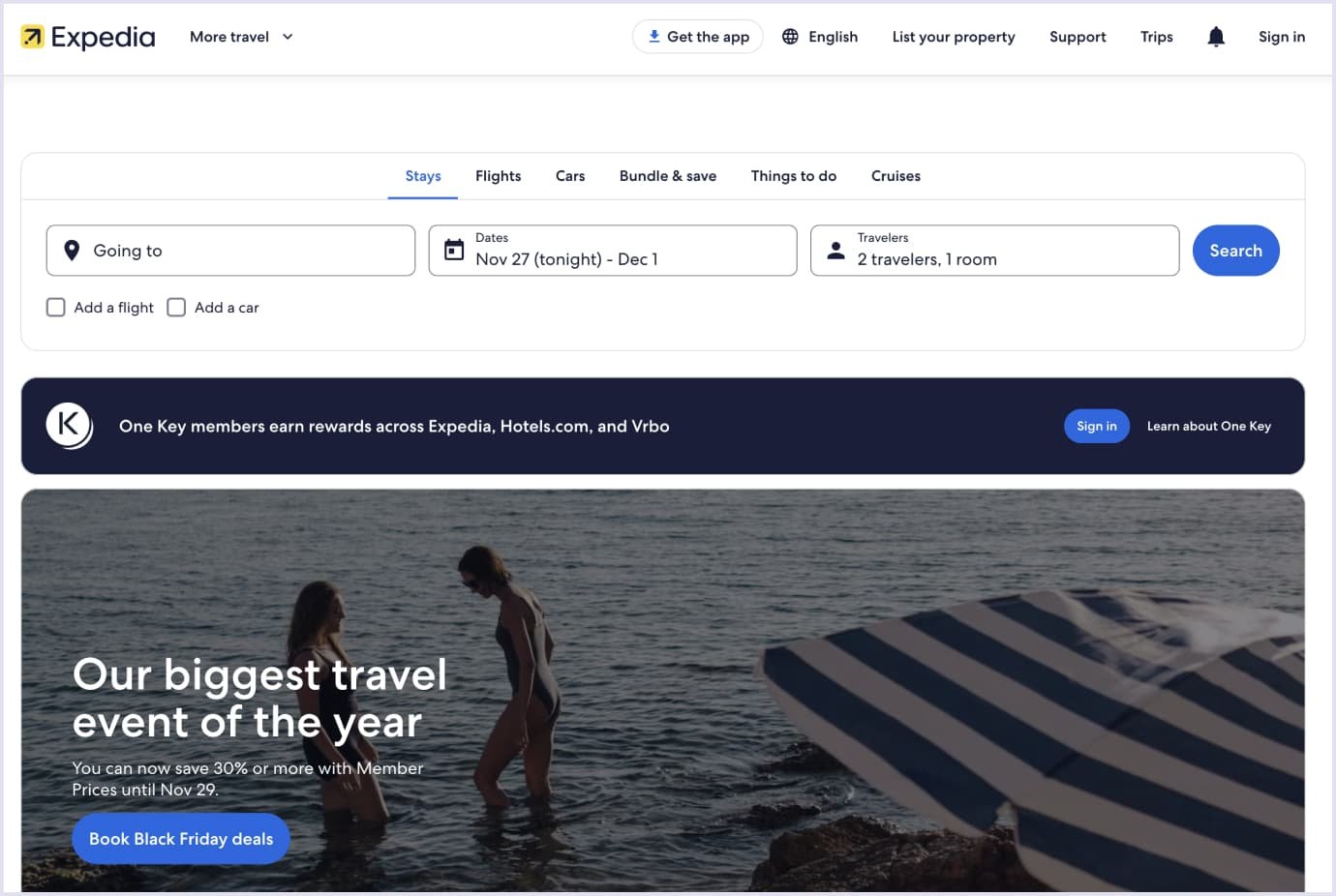
Source: Expedia
While Expedia is not typically top-of-mind for vacation rentals, they do offer this option through property type filters on their website and partnerships with various rental providers. The Expedia Group, owns several travel-related brands, including Expedia, Vrbo, Hotels.com, Hotwire.com, Orbitz, Travelocity, and CarRentals.com.
How do Expedia and Airbnb compare?
Expedia's diverse range of services gives it a broader audience compared to Airbnb. Historically, Expedia has primarily focused on hotels, similar to Booking.com, while Airbnb concentrates on short-term rentals.
This distinction suggests that vacation rentals might face less competition on Expedia than on Airbnb. However, it also implies that individuals may not specifically seek vacation rentals on the Expedia platform.
Airbnb operates all its services under the Airbnb brand, fostering a unified identity. In contrast, Expedia is a conglomerate managing its subsidiaries under their original brand names. As Airbnb continues to grow, it may pose competition to Expedia's subsidiaries with weaker brand recognition.
Despite these dynamics, both Expedia and Airbnb are prominent and recognizable brands within the vacation industry, each maintaining its distinct position and appeal.

Reasons why people prefer Airbnb over hotel booking sites
Before diving into how to develop an Airbnb-like platform, it’s worth considering what advantages it has over regular hotel booking sites. Apparently, the experience Airbnb provides differs from regular sites like Booking.com or Expedia. Thus, let’s take a look at what users think.
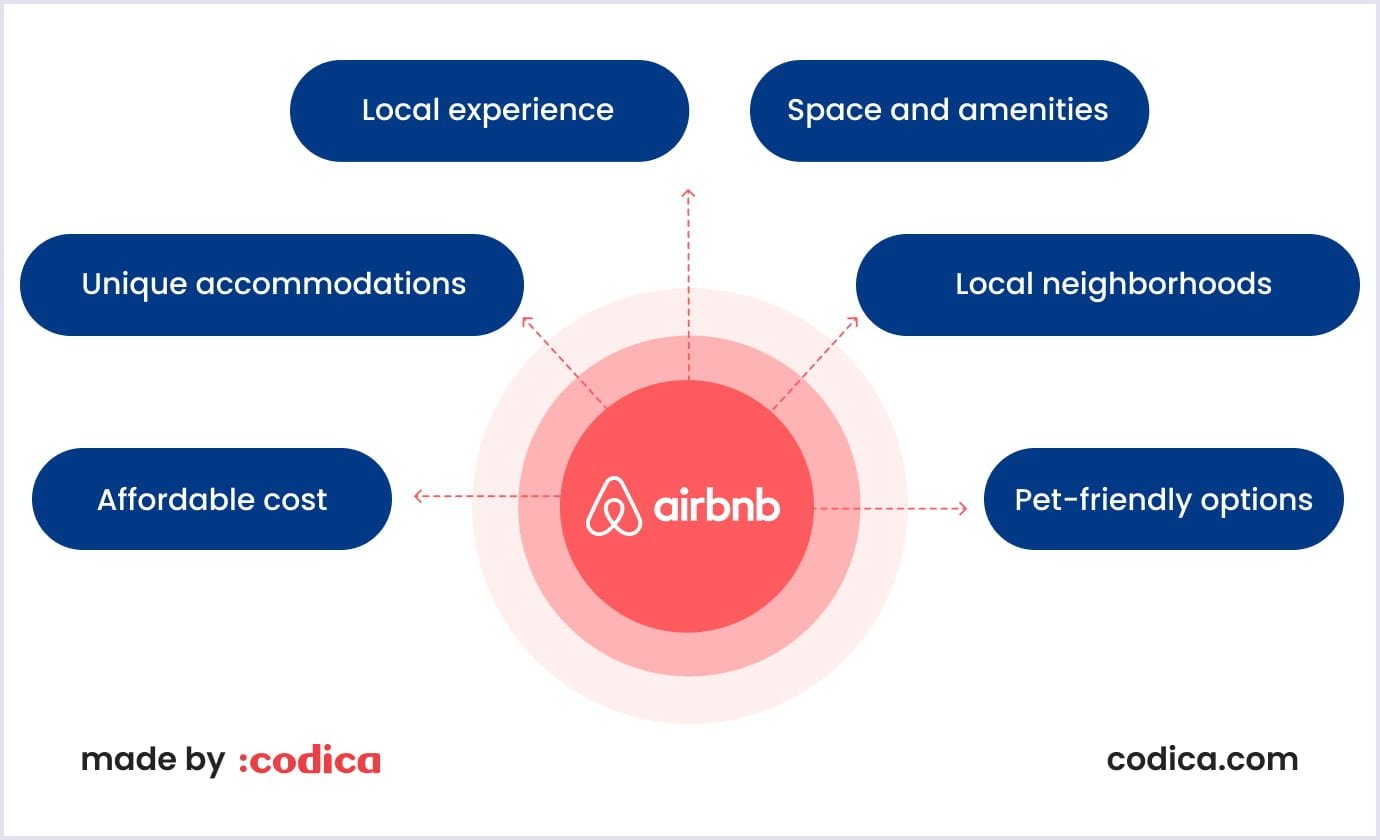
- Affordable cost. Airbnb listings often provide more affordable options than traditional hotels, especially when travelers seek budget-friendly accommodation. This booking platform is often a preferred option for travelers planning longer stays, as it can be more cost-effective and comfortable for extended periods compared to staying in a hotel.
- Unique accommodations. Airbnb offers a wide range of unique and diverse accommodations, such as private homes, apartments, treehouses, and more. This can provide a more personalized and distinctive experience for people seeking unconventional accommodation.
- Local experience. Many Airbnb hosts provide local insights and recommendations, allowing guests to experience a destination from a more authentic and local perspective.
- Space and amenities. Airbnb listings often offer more space than hotel rooms, making them particularly attractive for families or larger groups. Additionally, many Airbnb properties come equipped with kitchens and other amenities, providing a more home-like environment suitable for longer stays.
- Local neighborhoods. Airbnb accommodations are distributed throughout local neighborhoods, allowing guests to immerse themselves in the culture and atmosphere of a specific area, which may be different from the more centralized locations of many hotels.
- Pet-friendly options. Airbnb listings often include pet-friendly options, making it easier for travelers who want to bring their pets along.
Airbnb’s business model
If you want to know how to start a business like Airbnb, then it’s important to learn about its business model. It is based on sharing resources rather than providing services directly. The model allows the rental website owner to connect the sellers and the buyers and make money.
According to Airbnb’s policy, there are two distinct fee structures for stays: the split-fee and the Host-only fee.
Split-fee
- Host fee. Most hosts pay a 3% fee, with exceptions for certain cases, such as hosts with listings in Italy or those with Super Strict cancellation policies. This fee is calculated from the booking subtotal (nightly rate + cleaning fee + additional guest fee, if applicable, excluding Airbnb fees and taxes) and is automatically deducted from the Host payout.
- Guest fee. Typically under 14.2% of the booking subtotal, this fee varies based on factors and is displayed during checkout. For stays over three months, the Airbnb guest service fee is reduced after the third month.
Host-only fee
The entire fee is deducted from the host payout, generally ranging from 14–16%. Hosts with Super Strict cancellation policies may incur higher fees, while fees for monthly stays may be lower.
Apart from regular fees, there are also VAT charges. Depending on the jurisdiction's laws, VAT may apply to the fees mentioned. The service fee is VAT inclusive where applicable.
Here, you can see the platform commissioning structure for both visitors and hosts that helps generate revenue.
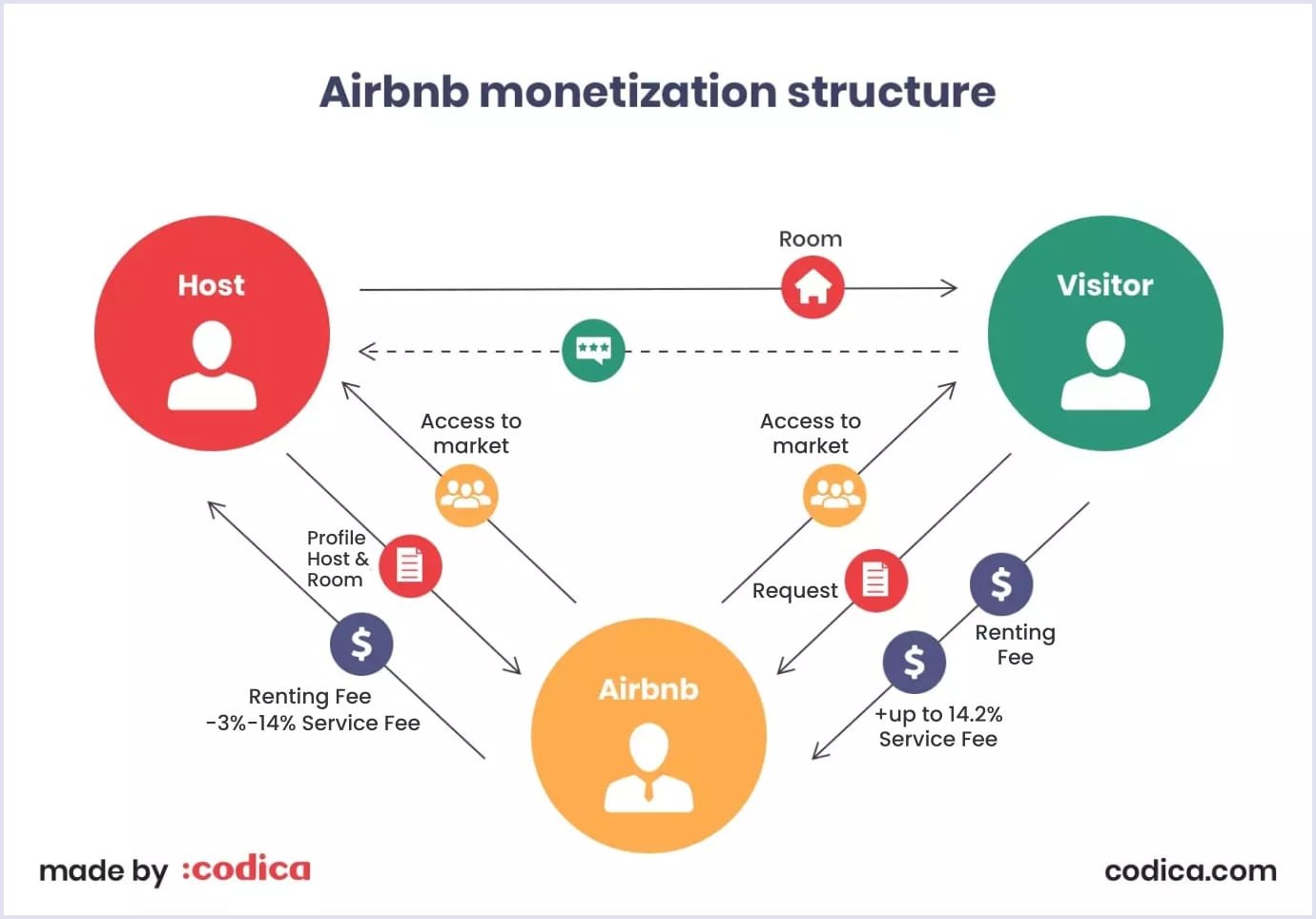
Additionally, Airbnb's business model provides insurance services. If a host incurs loss due to unexpected damage, Airbnb covers it. For example, the insurance compensates for additional cleaning or broken valuable property. As for now, Airbnb is the only rental marketplace platform that suggests this kind of support for hosts.
Related reading: Best Monetization Practices to Build a Successful Online Marketplace
5-step guide on how to build a website like Airbnb
There are several aspects worth noting to develop a solid Airbnb competitor. Thus, let’s shift the focus from theory to more practical tips. This way, you’ll know exactly which aspects are crucial for future success.
1. Choose the solution type
In fact, you can build such a platform with the help of two options:
- Ready-made solution;
- Custom development.
Both options have their benefits and drawbacks that depend on users’ needs and preferences. Let’s take a quick look and define when and why you need to use each option to understand how to start a website like Airbnb.
Ready-made solution overview
If you’re looking to start a product in a matter of weeks at an affordable price, a ready-made template is a pretty good choice. By the way, you can choose either a non-customizable or a customizable template that will give more space for customization. However, you will need to scale the product sooner or later.
Considering the most popular solutions, we recommend you pay attention to Sharetribe, RocketBazaar, Yo!Kart, CS-Cart, and Shopify. These platforms offer a wide range of functionality, so you can choose different solution options at any price while deciding how to create an Airbnb inspired website. Your marketplace information will be stored on the servers along with thousands of other websites.
Custom development from scratch overview
In case you want to have specific business logic and be user-oriented to the maximum degree, online marketplace development will work best for you.
This approach is rather time- and cost-consuming, but as a result, you will get a fully functional web application created by a professional software development team. They will take into account all your preferences and business requirements to bring your ideas to life.
Summing up the comparison, let’s outline the most important aspects to consider when choosing between a ready-made solution and a custom-developed project.
| Feature | Ready-made solution | Custom development |
| Time to market | Quick deployment, often within days or weeks. | Longer development time, several months to a year, depending on complexity. |
| Cost | Lower upfront costs but may have subscription or transaction fees. | Higher initial costs but potential for long-term cost savings and flexibility. |
| Customization | Limited customization options; follows a predefined template. | Fully customizable to meet specific business requirements and unique branding. |
| Scalability | Limited scalability; may face constraints as the business grows. | Highly scalable, adaptable to business growth and evolving needs. |
| Unique features | Limited ability to add unique features without significant modifications. | Full control to implement any desired features, ensuring a unique user experience. |
| Technical control | Limited control over technical aspects; relies on the provider's updates. | Complete control over the technology stack, updates, and infrastructure. |
| Maintenance | Simplified maintenance as updates are managed by the provider. | Requires ongoing maintenance, but allows for immediate response to issues and updates. |
| Security | Relies on the provider's security measures. | Customizable security measures based on specific business needs and industry standards. |
| User experience | Standardized user experience with minimal room for customization. | Tailored user experience designed to align with the brand and user expectations. |
| Integration | Limited integration capabilities; may not seamlessly connect with existing systems. | Full integration flexibility, enabling seamless connection with various third-party services. |
| Ownership | Less ownership as the solution is hosted externally. | Full ownership of the code, data, and infrastructure. |
You may also like: Building a Future-Ready Marketplace with MACH Architecture
2. Choose the technology stack to build a website like Airbnb
Let’s now discuss how to build your rental marketplace platform by choosing custom software development services and the Airbnb technology stack.
The technology stack is crucial for a project development process. Firstly, it greatly affects the budget because every tool has its own degree of complexity. Thus, the rates will significantly differ. Secondly, it makes a huge difference in product scalability and the time required for development.
Alongside this, you should keep in mind that the modern Airbnb marketplace platform utilizes a pretty powerful technology stack and a large number of tools. In terms of the marketplace minimum viable product (MVP), you will not need that full range of instruments for the frontend and backend. Most likely, you will use far fewer engines, and they may be completely different.
You can use the following technology stack to develop a website like Airbnb:
- Frontend development — JavaScript (React, Vue.js), HTML5, CSS3;
- Backend development — Ruby, Strapi, Node.js, Ruby on Rails, Nest.js;
- Automation frameworks — RSpec, Capybara;
- Databases — Redis, Firebase, MySQL, MongoDB;
- Infrastructure — AWS, Digital Ocean, Heroku;
- Web application server — Puma.
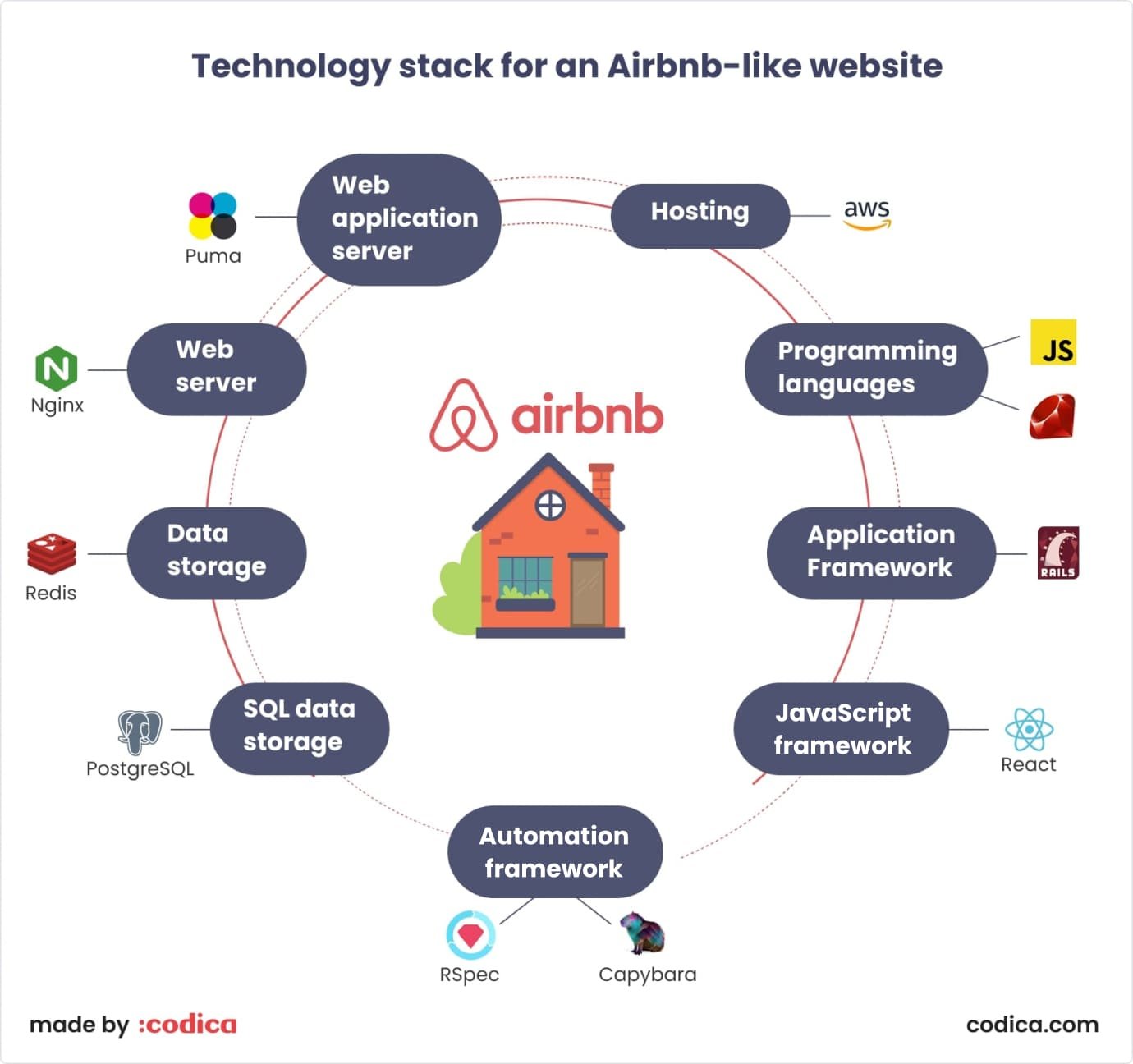
As you can see, we offer Ruby on Rails as the main application framework for building an Airbnb-like website. It will assist you in developing your MVP website rapidly and affordably, and Rails will also make your online marketplace platform scalable, productive, and protected.
As for the Airbnb platform, even though it implements a vast technology stack, it still runs on the RoR framework. Therefore, it may be a good idea to build a room booking site like Airbnb with Ruby on Rails as well.
Recommended reading: How Much Does It Cost to Build an Online Marketplace in 2025?
3. Define the functionality required for a rental marketplace
When you create a website like Airbnb, the features and functionality you include play a pivotal role. Thus, make sure you include not only the basic ones but also those that will ease the usage process for both travellers and hosts.
As Joe Gebbia puts it, the story from a customer about the challenging experience of using the service opens many possibilities. So, users’ insights help you to define the needed features. By defining the relevant functionality, you can assess how much it will cost to build a website like Airbnb.
Here are the core features required for an online marketplace like Airbnb:
Authorization and roles
The platform users are divided into travelers and hosts. The latter publish their accommodation and specify the details. Guests can see all the available options, comprehensive information, and book real estate listed or contact the owner. The roles are typical for a marketplace like Airbnb.
Moreover, the authentication feature allows suppliers and consumers to change their roles at any time. For example, today, you have an empty villa for rent; you will probably be making a business trip to another city and searching for accommodation.
Personal profile data
Users should have an opportunity to modify their settings smoothly and conveniently. For instance, they may want to adjust their account settings like e-mail, password, phone number, etc. This feature builds confidence between the customers and your Ruby on Rails marketplace.
Listing
Both platform sides fill in the most useful data. Sellers specify the details about the accommodation provided, including locations, types, and prices. So, how much does it cost to stay in a particular place? A traveller will know from the data listed by a host.
Online maps
This function allows customers to navigate the local area and find the most relevant lodging. Also, it provides a sorting system to search around the area and get a quick property preview with the name, price, and a couple of photos.
Also, the algorithm shows you the most popular accommodations based on users’ views and visits. This feature is widely used on platforms like Airbnb.
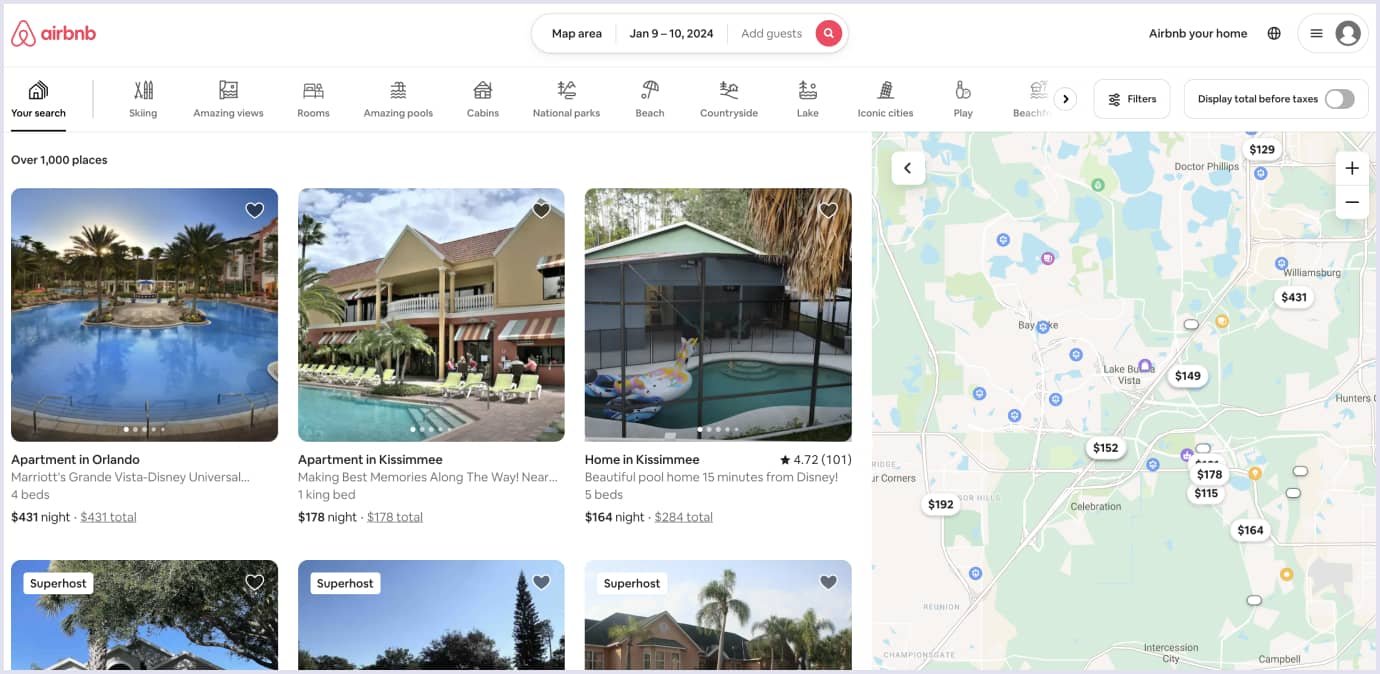
Source: Airbnb
Messaging
When considering the option of making a website like Airbnb, you should not avoid such a meaningful feature like messaging. It is crucial as it allows travellers to discuss any details with the hosts, like arrival time, delays, number of guests, etc.
Booking management system
This is one of the essential features of Airbnb. When travellers search for accommodation, they want to book it for a particular date. This way, a homeowner receives a notification and decides whether to confirm or decline the booking. It makes the marketplace more flexible compared to Booking.com for the following reasons:
- Hosts have the opportunity to solve any issues before confirming a booking;
- In case it is impossible to provide lodging, homeowners may decline a request.
Booking system development may be adjusted for a particular time when a guest is flexible on travel time.
Recommended reading: How We Delivered MVP for PlanMyKids - Kids Activities Marketplace (Case Study)
Notification system
Push notifications allow both guests and hosts to reach a certain web page as fast as possible. It works pretty simply: you get a notification, click on it, and immediately shift to a certain page. This way, it greatly boosts user experience on an Airbnb-like marketplace and accelerates many processes.
It is pretty convenient, isn’t it? This feature will enable the users (both travellers and hosts) of your online marketplace to always stay up-to-date.
Online payments
Airbnb architecture allows booking marketplace travellers and hosts to send and accept payments for their services. The development of online payment systems should be based on intuitive design and ensure security.
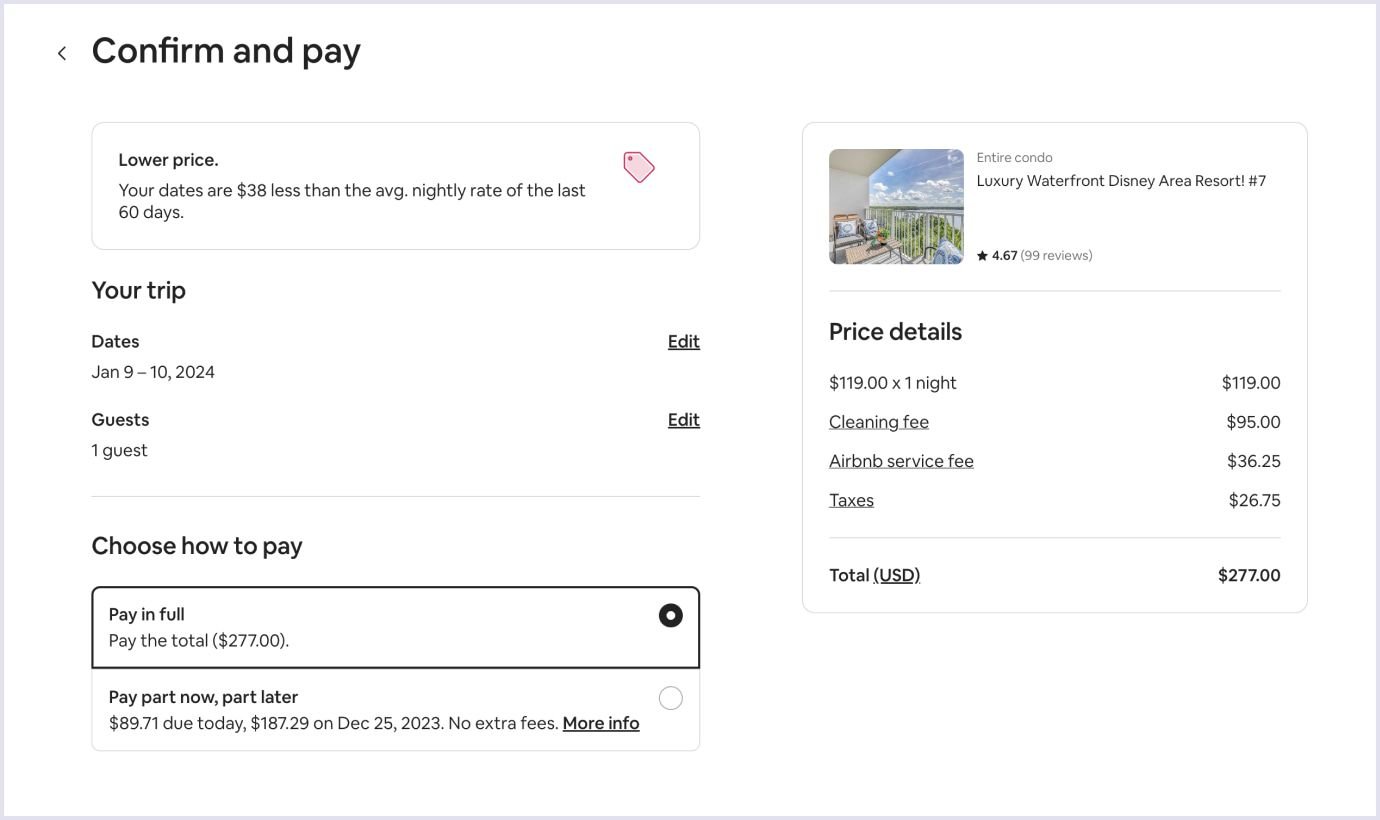
Source: Airbnb
Cancellation options
If the traveler’s plans change, the host may set their conditions for booking cancellation. It is helpful to improve guests’ and hosts’ experience with using a marketplace like Airbnb.
Flexible dates
With more people working remotely, a flexible search for accommodation has become more relevant. Travellers can choose where to spend their weekends or off-peak days. At Airbnb, the date range expands up to 12 months. Brian Chesky noted that the Airbnb button “I’m flexible” was used 500 million times.
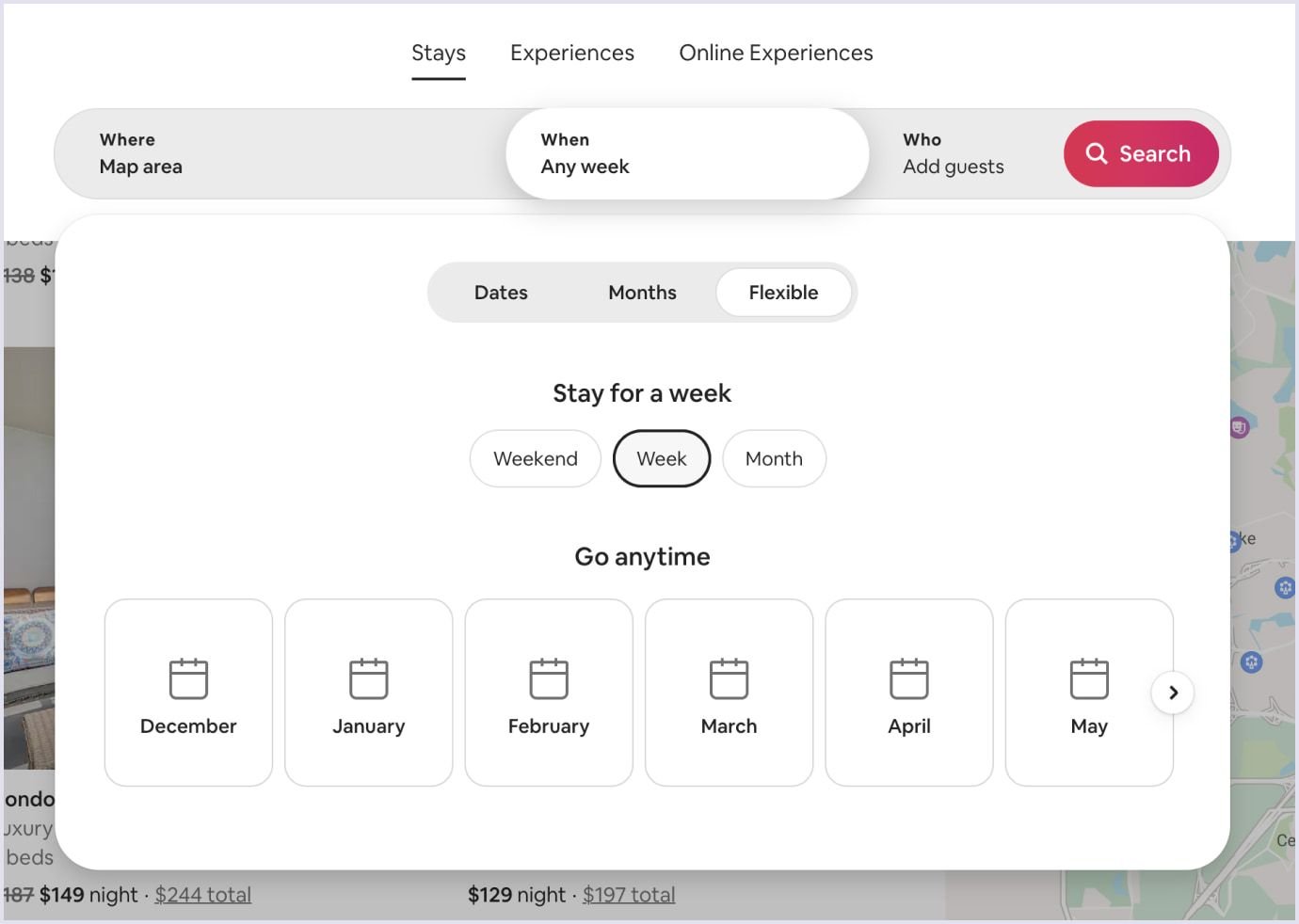
Source: Airbnb
Translation engine
Airbnb has introduced a translation of descriptions and reviews into over 60 languages. You don’t need to click on translation buttons as the function works automatically. Besides, the engine learns from new content, improving over time.
Community support
For an online marketplace like Airbnb, it’s crucial to have powerful community support. This feature provides both hosts and travellers with 24/7 access to support services that solve the problems of platform users.
When planning how to start a website like Airbnb, apart from general functionality, you need to consider the features of each platform side. Let’s take a brief look at the functionality necessary for hosts and guests of an Airbnb booking system.
| Functionality for all parties of a platform like Airbnb | ||
| Travelers (buyers) | Hosts (suppliers) | Additional features |
| Add & edit profile details | List property | Comparison of multiple accommodation options |
| Use search & filtering options to find properties | Wizard listing | 360 accommodation virtual tours |
| Get apartment details | Set the pricing & availability | Advanced filters |
| Book a property & add it to a wishlist | Set the payment details | Accommodation activity by platform |
| Use integrated messenger to contact a host | Use integrated messenger to contact a guest | Options for flexible dates and stays |
| View upcoming/past bookings and reservations details | Accept/decline booking requests | Translation tool |
| Receive push notifications | View upcoming/past bookings and reservations details | Cancellation options |
| Submit reviews | Submit reviews | |
| Add/delete payment methods and see transaction history | Add/delete payment methods and see transaction history | |
Airbnb is continuously working on improvements for the platform. The majority of innovations and improvements Airbnb implements are inspired by real users. Brian Chesky, as well as other Airbnb team members, regularly ask people and listen to their audience on social media and other platforms.
4. Follow common marketplace design principles
You may be wondering how to make an Airbnb clone website in terms of design. Does it have to be attractive and high-quality? The reason for this question is that many people believe that while building a website like Airbnb, you should put the conversion and functionality aspects first.
However, the first thing you see when visiting the site is Airbnb web design often considered iconic and recognizable. This way, your initial impression and, consequently, further purchases completely depend on this crucial aspect.
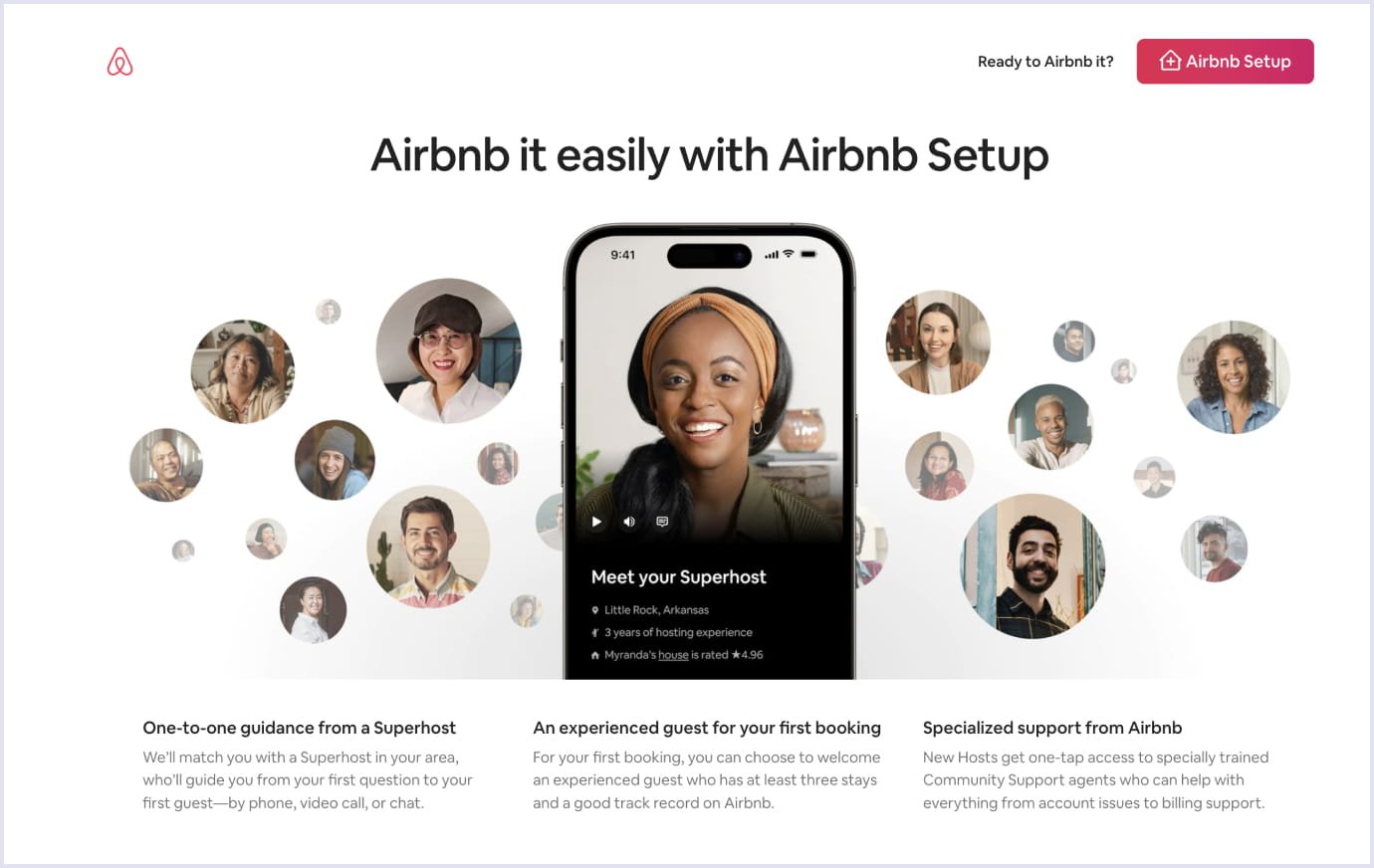
Source: Medium
“The design has always been important at Airbnb – it was founded by designers, and the first guests came to a design conference in San Francisco. Some of the biggest changes have come from scaling and adapting to the momentum.”
- Alex Schleifer, former Airbnb Vice President of Design
Airbnb web design has two key principles: designing for trust and designing for everyone. Thus, in April 2016, Airbnb introduced an updated app design following these two principles. The platform development team made everything to match people to houses, neighborhoods, and experiences that will help them live like a local.
Find out more: How UX Design Solves Online Marketplace Issues
5. Build a rental marketplace minimum viable product
We recommend you to build a marketplace MVP first instead of creating a fully functional product at once. The MVP development services will help you save time and money. Also, you will get valuable feedback from investors (if any) and a target audience that will help you validate your idea.
You need to include only the primary functionality during marketplace MVP development. Over time, you will expand the platform, implementing add-ons and optional features.
Here is the primary functionality that should be implemented on an MVP web development solution like Airbnb:
- Sign up/sign in. It allows users (both guests and hosts) to create an account where they can manage personal data.
- Guest and host roles. You need to diversify the platform roles to provide travelers with the ability to search for and book accommodation and allow homeowners to list their property and specify the required details.
- Search option. It helps travelers find relevant lodging and experiences. This feature is widely used when making a website like Airbnb.
- Filters. This way, travelers can clearly define their request by choosing a certain real estate type, price, availability, inner facilities, amenities, number of rooms, beds, bathrooms, etc.
- Property page. It should contain a full and comprehensive description including facilities, amenities, number of beds, bathrooms, and accommodation type. Also, you need to make the ‘Contact Host’ button as vivid as possible so that users do not find it difficult to book accommodation on websites like Airbnb.
- A host contact form. When users click on a CTA button, provide them with a form that stands for the final user journey stage. It should require travelers to fill in important information and send an email to a host. This way, suppliers will receive a notification and respond to consumers in any possible way.
- Communication channels. It would be a good idea to add an online chat where users can communicate and discuss the details. Marketplace development may also include a call function for immediate communication.
- Cancellation options. Plans may change, so this function allows a guest or a host to cancel the booking if necessary. Airbnb’s business model includes the conditions on which cancellation is made
The above-mentioned core features can help you estimate how much it may cost you to build a website like Airbnb.

Core marketplace design guidelines
Now, let’s take a look at the most important principles in Airbnb website design that will help you create an attractive web solution for your accommodation rental marketplace platform like Airbnb.
Simple message
According to one of the most crucial ecommerce website design principles, the message you deliver should always be clear to your potential users. First of all, implement a simple and intuitive design that will help customers understand what products and services are available. Also, emphasize the strong points of your website that make it stand out from the market rivals.
Intuitive navigation
Navigation and user journey are the foundation stones of usability in the Airbnb website design. The easier it is to buy products, the more sales are generated. Build a simple-to-understand and efficient user flow that will allow your target audience to find and purchase the desired accommodation in a few steps.
Trust level
You should avoid tons of information on the webpage. Otherwise, the users will feel overwhelmed and will likely leave your marketplace without any purchase. Create trustworthy photos of products, give a full item description, and implement a feature that allows customers to leave comments or reviews for other potential guests.
Below, you can see the design that Codica created for search and scheduling functions in an Airbnb-like rental app. A lot has been done to deliver a trustworthy platform, and design plays a crucial role in this regard.
For this platform, we used Semantic UI to build a visually appealing UI design for the solution. Thus, thanks to the intuitive user flow and superior UI/UX design, the platform is easy to use and clear, boosting the user experience and affirming that it is the design that plays a huge role in such cases.
A website like Airbnb development cost
To make sure you are ready for your platform development and launch, we have prepared an approximate cost of a peer-to-peer marketplace like Airbnb.
Please bear in mind that the final price of such a platform depends heavily on such factors:
- The functionality you wish to have on your rental marketplace platform;
- The development approach you choose;
- The location, and, consequently, the rates of your development company.
Taking into account all the functionality discussed above, the average cost of a rental housing website is as follows:
| Features | Time, hours | Cost ($50/h) |
| Design | ||
| UX development | 64 | $3,200 |
| UI development | 96 | $4,800 |
| Architecture | ||
| Project setup | 16 | $800 |
| DB structure | 32 | $1,600 |
| Integrations | ||
| Payment (Stripe or PayPal) | 64 | $3,200 |
| Main functionality | ||
| Authorization and security | 48 | $2,400 |
| User profiles | 64 | $3,200 |
| Homepage | 64 | $3,200 |
| Search and filters | 96 | $4,800 |
| Reviews and ratings | 32 | $1,600 |
| Payout | 32 | $1,600 |
| Notifications | 64 | $3,200 |
| Messenger | 32 | $1,600 |
| Geolocation feature | 32 | $1,600 |
| Managing listings | 64 | $3,200 |
| Booking system | 64 | $3,200 |
| Property page | 72 | $3,600 |
| Guests panel | 48 | $2,400 |
| Hosts panel | 72 | $3,600 |
| Admin panel | 80 | $4,000 |
| Non-development activity | ||
| Project management | 64 | $3,200 |
| Quality assurance | 80 | $4,000 |
| Code review | 32 | $1,600 |
| Total | 1312 | $65,600 |
To sum up, we should mention that the final price can vary, and only your software development partner will be able to provide you with an exact quote.
However, you can count on the quoted numbers if you want to know how much it costs to create a good website for a vacation rental with a development company located in Eastern Europe.
Read also: What is Project Discovery Phase in Custom Software Development
Codica’s expertise in developing Airbnb-like solutions
Our expert team has vast experience in building marketplaces, including accommodation rental websites. The comprehensive approach we developed allows the creation of Airbnb-like solutions that help your business grow.
We use efficient technologies and methods in the development process. They allow us to make optimized, noticeable, and intuitive websites. A clear example of this approach would be a custom SaaS platform for real estate we recently developed.
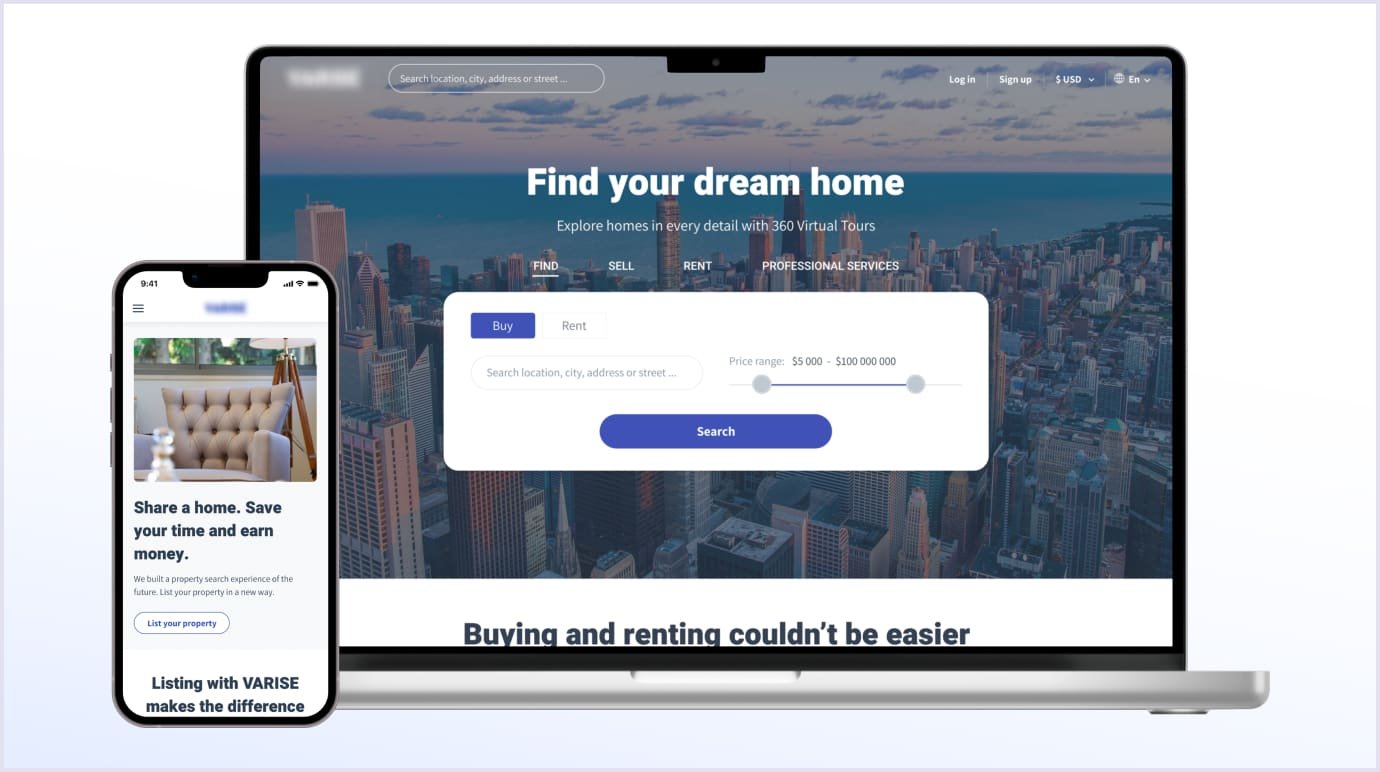
The platform includes dynamic functionality, enabling users to find the best accommodation locations while casually scrolling through the platform. After all, we added several key features allowing users to fully control what they see.
In this regard, the addition of a smart search system was a great decision. This way, users can easily sort and filter the property to see only the most relevant results. Once users find what they like, they can see all the details specified by the owner as well as engage in a 3D tour presenting the property in detail. Thanks to our quality assurance services, the system reliably guides the customers through the property.
Lastly, the addition of a map is another beneficial aspect of the platform. With its help, users can not only review the property but also see it on the map along with other lodgings they like or may like in the future.
If you want to create your own Airbnb, we are eager to help you. For example, we can help you discover the needed technologies and estimate how much it may cost to create a good website for a vacation rental relying on our product discovery services.
Read also: How Automation Testing Increases Execution Speed, Test Coverage, and Effectiveness
Final words
Although it’s a time- and cost-consuming process to create a marketplace website like Airbnb, it is a completely sizeable task. However, you need to keep in mind that the features and tools that Airbnb uses may somehow differ from yours because of different implementation aspects. Thus, follow the above-mentioned principles and techniques and customize your product to make it unique.
In this regard, if you are looking for a team that can help you create a high-quality and money-making accommodation rental marketplace, we've got you covered. The Codica team has built multiple marketplace websites. We know exactly how to build a website like Airbnb, and we will gladly help you create yours. Feel free to check out our portfolio or contact us to discuss your project.

